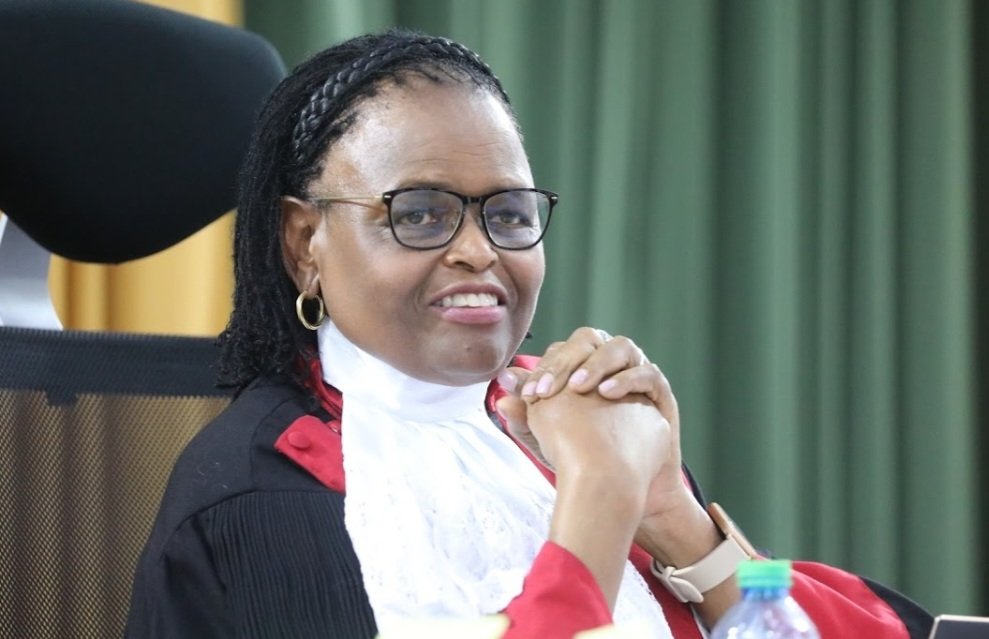Kenya’s top judge: No-one has ever tried to bribe me
3 min read
Martha Koome

Martha Koome
Kenya’s Chief Justice, Martha Koome, has firmly rejected recent allegations of corruption within the judiciary, asserting that no one has ever attempted to bribe her during her 22-year career as a judge. In an interview with the BBC, Koome, the first woman to hold the position of Chief Justice in Kenya, said, “In all these 22 years I’ve been a judge and a chief justice, nobody has ever approached me with a bribe. I would have them arrested.”
The remarks come amid accusations that the judiciary has failed to properly address corruption and bribery, with some critics using the term “jurispesa” to describe the alleged culture of corruption within the legal system. The term combines “jurisprudence” with “pesa,” the Swahili word for money, implying that money influences legal decisions. Koome has vehemently defended her record and that of her colleagues, challenging anyone with evidence of wrongdoing to bring it to the attention of law enforcement or the judicial oversight commission.
“These claims are intended to lower my credibility,” Koome said. “It is supposed to distract me. I know who I am, and I know what I have done and what I am going to do.” Despite these allegations, she remains resolute in her belief that her leadership has remained free from corruption. In 2021, Koome had previously acknowledged that corruption within the judiciary was a “national embarrassment,” but emphasized her commitment to reform.
Koome, however, also suggested that some of the criticism aimed at her stems from her gender, calling it “total misogyny” and “total chauvinism.” She pointed out that as Kenya’s first female chief justice, she has faced challenges that her male predecessors likely did not. Nonetheless, she remains undeterred and focused on her work, especially in areas that directly impact vulnerable populations, such as women and children.
One of the issues that Koome has been particularly vocal about is the increasing levels of violence against women in Kenya. She described it as “completely disheartening” to witness the daily reports of young women losing their lives to violence. Recent statistics show that nearly 100 women and girls have been killed in the last three months alone, and over 500 women have been victims of femicide between 2016 and 2024, according to the Africa Data Hub.
Koome has expressed her determination to tackle these issues head-on, including increasing access to justice for women who have been victims of gender-based violence (GBV). She revealed plans to establish 11 specialized courts across the country to handle sexual and gender-based crimes, with two courts already operational in Kisumu and Siaya counties. These courts are designed to prioritize GBV cases, ensuring that victims do not have to endure prolonged legal battles.
“We have a lot of hope in them because cases of gender-based violence must be given priority,” Koome explained. “So that the victim who was violated does not keep coming to court, year in, year out.” This initiative is part of Koome’s broader vision to improve the efficiency and effectiveness of the justice system in handling cases of sexual and gender-based violence, which have long been a concern for women’s rights groups in the country.
Despite her efforts to combat both corruption and violence against women, Koome has faced continued scrutiny from critics. However, her determination to lead reforms in the judiciary and advocate for gender justice remains strong. She has also highlighted the importance of addressing the root causes of violence against women, which often stem from deeply entrenched social and cultural attitudes toward gender equality.
As Kenya’s first female Chief Justice, Koome is breaking new ground, not just in her leadership role but also in her commitment to ensuring that women’s voices are heard in the legal system. Her efforts to combat corruption, misogyny, and violence against women signal a promising shift toward greater accountability and protection for vulnerable groups in Kenya. However, the true impact of her reforms will depend on the continued support of both the judiciary and the Kenyan public, as well as the successful implementation of her plans for specialized courts and other legal reforms.
Koome’s tenure as Chief Justice, which began in 2021, has been marked by both challenges and progress. As she continues her work, many will be watching to see whether her vision for a more transparent, just, and equitable judiciary will be fully realized in the years to come.